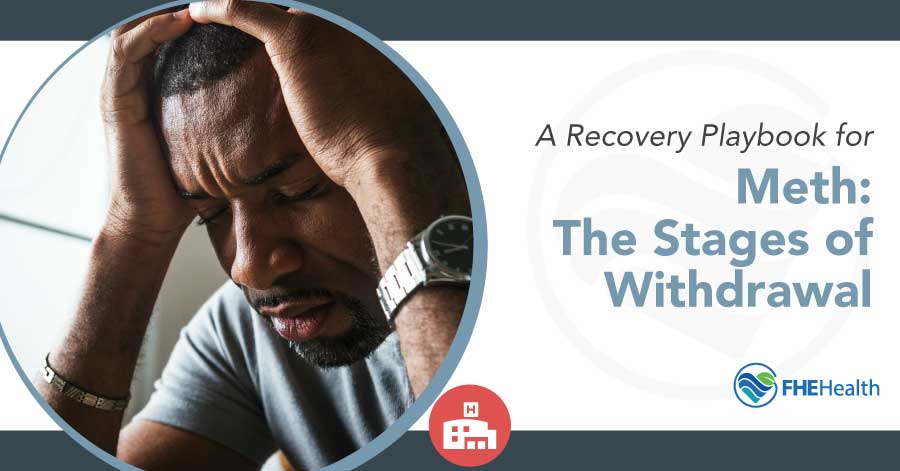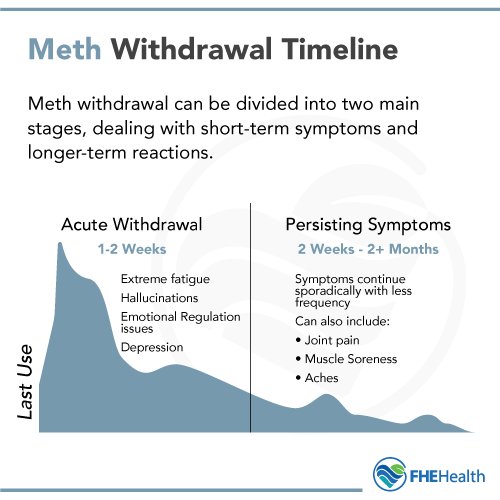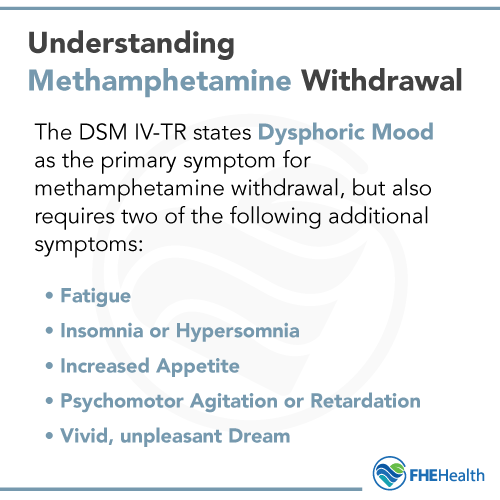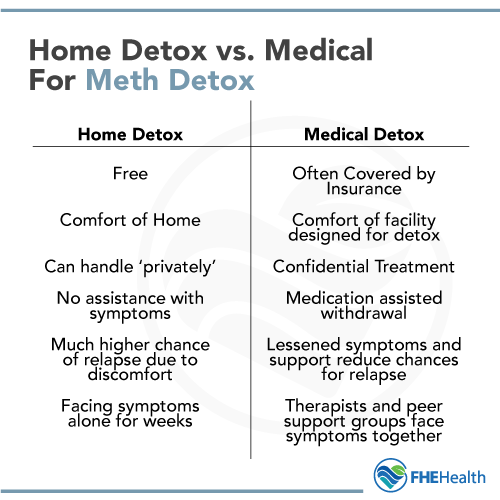
Meth is an extremely addictive drug, with psychological and biological factors coming into play to increase the chance that someone will repeatedly return to using the drug. The high of meth is intense and leaves the person with a major crash after the drug has left the system.
Many people almost immediately begin seeking their next high, chasing the focus and euphoria that come from using meth. Add to that the very uncomfortable and sometimes dangerous effects of meth withdrawal symptoms, and you have a formula that can keep people caught in the cycle of addiction.
Because education is one way to build a foundation for that first step, understanding the stages of meth withdrawal can be important for anyone who is trying to quit. This may feel like an isolated struggle, but around 1.6 million people in the United States have used meth in the past year. And there are numerous options for detox and recovery.
Here’s what you need to know about meth withdrawal timelines and how professional treatment can help.
Meth Withdrawal Timeline

Let’s start with the good news: Medically assisted detox can dramatically reduce withdrawal woes and help you get through the early phases of withdrawal more comfortably.
However, withdrawal symptoms can last up to five weeks with intermittent issues, such as cravings, hitting you even months later. The withdrawal time period is usually a month or two, but addiction is a chronic illness that can impact you later in life. That’s why it’s important to work through inpatient rehab, work on developing good coping skills, and build a solid support network for help with long-term recovery.
Here’s a look at the timeline of meth withdrawal without any professional intervention.
Phase 1
- Meth withdrawal can begin within hours after you stop using and build up in intensity to reach a peak within the first 24 hours.
- Withdrawal symptoms begin to diminish after the first few days, falling to a lower baseline within a week or two.
- For most people, the first few weeks (the first phase) are the most difficult to deal with when it comes to withdrawal.
- Symptoms likely to come to an end or be drastically reduced over the first phase of meth withdrawal include exhaustion or extreme fatigue, hallucinations, and some mood issues, including depression.
Phase 2
- Symptoms can persist regularly at reduced severity for two to three additional weeks.
- In some cases, individuals may experience post-acute withdrawal symptoms. These less severe withdrawal symptoms can extend for additional weeks or months.
- Symptoms most likely to continue through phase two and beyond include anxiety, cravings for meth and carb cravings.
The information above is general in nature, and it’s important to remember that everyone is different. How you came to meth addiction and how you react to the drug is unique to you. That means withdrawal symptoms, while they may follow the generalities above overall, are also going to be slightly different for you than they are for anyone else.
For example, how severe your withdrawal symptoms are and how long they last can depend on factors including:
- How long you have been abusing meth
- How much meth you needed to get high
- Your age and other demographic factors
- Your personal health
- Whether you are also dealing with other substance abuse withdrawal timelines
At FHE Health, we treat every person individually, working with you to understand the needs of your body, mind, and soul so we can help you battle withdrawals appropriately and create a solid foundation for the rest of your rehab. Call us if you’re ready to break the cycle of meth addiction, regardless of what withdrawal symptoms you may be worried about or feeling.
What Is Meth Withdrawal?

That means your body is so used to the drug’s impact that it’s not sure how to function without it. This happens because many drugs, including meth, interact with receptors in your brain and other parts of your nervous system to enact changes in your body — that’s what causes the effects of any high you might experience. The signature physical symptoms of withdrawal and use are typically itching ‘meth mites’, dental hygiene, and open sores.
But meth withdrawals can also be of a mental and behavioral nature. Some of the mood changes that occur with meth withdrawal are because of the changes going on in your body.
Other mental and emotional aspects could be linked to a psychological need to use the drug or to other withdrawal symptoms. For example, stomach issues and joint pain can make any depression you might be experiencing worse.
Some symptoms you might experience with meth withdrawal include:
- Anxiety
- Sleepiness or excessive fatigue
- Depression
- Hallucinations (auditory or visual)
- Stomach issues, including constipation or diarrhea
- Vomiting or nausea
- Clammy skin or sweating
- Shaking or tremors you can’t control
- Irregular heartbeat
- Eyes that are red, itchy, or swollen
- Pain in your joints or muscles
- Hyperventilation (which is breathing too fast to get enough oxygen to the brain)
- Headaches
- Changes to appetite
- Problems with memory and concentration
- Cravings for carbs
How Can Medical Detox Help With Meth Withdrawal Symptoms?

At FHE Health, we treat methamphetamine addiction with a carefully planned, compassionate approach that takes your unique factors into account. We understand the impact that meth withdrawal symptoms can have on your recovery, so we offer specific help for overcoming this barrier and stepping confidently onto the recovery path.
Medically assisted detox includes:
- Treatment by licensed medical doctors and nurses
- 24/7 supervision, so you can reach out at any time for help easing pain or overcoming other withdrawal symptoms
- A proactive clinical approach that helps ensure your comfort while also getting you started on rehab
We know that peace of mind is critical as you approach this change in your life. That’s why we work to provide a comprehensive evaluation and understand all the mitigating factors you may have in dealing with withdrawals. We help you manage those symptoms alongside other physical or mental health concerns while striving for sobriety now and in the future.
For more information on our medically assisted detox services and how we can help you move past common meth withdrawal phases to inpatient rehab and long-term sobriety, contact us today. Our caring and compassionate admissions counselors are always available to offer answers and help you understand what your treatment options are.






